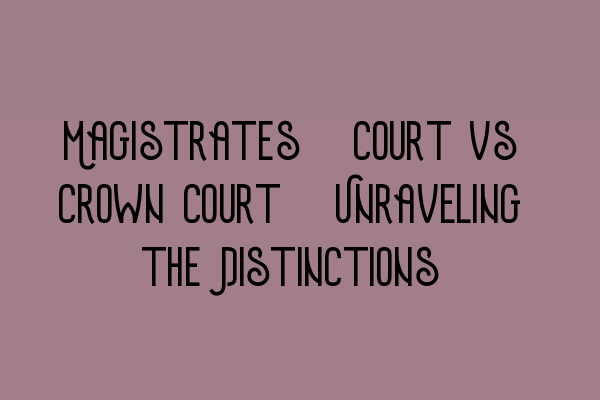Magistrates’ Court vs Crown Court: Unraveling the Distinctions
When it comes to criminal proceedings in the UK, there are two main types of courts: Magistrates’ Court and Crown Court. Understanding the distinctions between these two courts is essential for anyone involved in or seeking information about the criminal justice system.
Magistrates’ Court
Magistrates’ Court is usually the first point of contact for most criminal cases in the UK. It handles the majority of criminal matters, including less serious offenses and preliminary hearings for more serious offenses. Magistrates’ Courts are presided over by a panel of magistrates, also known as justices of the peace, who are appointed from the local community.
One key distinction of the Magistrates’ Court is its limited sentencing powers. It can impose fines, community orders, and custodial sentences of up to six months for a single offense, or up to 12 months for multiple offenses. However, for more serious crimes such as murder or rape, the Magistrates’ Court will only conduct the initial hearing before transferring the case to the Crown Court for trial.
Magistrates’ Court proceedings are generally quicker and less formal compared to those in the Crown Court. This court is designed to handle less complex cases, and while legal representation is allowed, it is not always necessary. Defendants also have the right to choose whether their case is heard in the Magistrates’ Court or the Crown Court if the offense is “triable either way,” meaning it can be heard in either court.
For those preparing for the SQE 1 exam, it is important to have a solid understanding of the criminal justice system and the roles of different courts. Click here for SQE 1 Practice Exam Questions and enhance your knowledge.
Crown Court
The Crown Court deals with more serious criminal cases that are beyond the jurisdiction of the Magistrates’ Court or transferred from there for trial. It is presided over by a Judge, and serious offenses such as murder, rape, and drug trafficking are typically tried in this court.
Crown Court trials involve legal professionals, including barristers and solicitors, who present their case before a Judge and a jury. The jury, consisting of 12 members of the public, assesses the evidence and determines the defendant’s guilt or innocence. Unlike the Magistrates’ Court, the Crown Court has the power to impose more severe punishments, including longer custodial sentences, life imprisonment, and fines without any maximum limit.
Preparing for the SQE 1 or SQE 2 exams? Check out our SQE 1 Preparation Courses and SQE 2 Preparation Courses to enhance your legal knowledge and improve your chances of success.
Choosing the Right Court
Defendants charged with offenses that can be tried either in the Magistrates’ Court or the Crown Court have the right to choose their preferred court. The decision is usually based on factors such as the seriousness of the offense, legal representation, and the presence of a jury trial. Seeking advice from legal professionals is crucial in making the right decision.
For information on the upcoming SRA SQE exam dates, click here: SRA SQE Exam Dates. Stay informed and plan your preparation effectively.
Conclusion
Understanding the distinctions between Magistrates’ Court and Crown Court is vital for anyone involved in the UK criminal justice system. While Magistrates’ Court deals with less serious offenses and has limited sentencing powers, the Crown Court handles more serious cases and has the authority to impose severe punishments. Choosing the right court is crucial, and legal advice should be sought to make an informed decision.
For comprehensive preparation for the SQE 1 exam, check out our SQE 1 Practice Mocks to sharpen your skills and build confidence.
